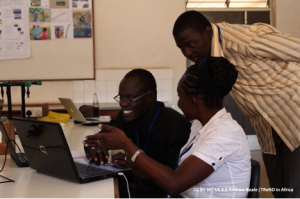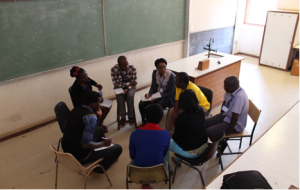African researchers learn how to get their message to a global audience
TReND organized a course on Science Communication and Writing for young African researchers.
“All forms of science require expertise in scientific communication, with publishing of manuscripts being just one communication aspect.” says Dr Andrew Beale, the Malawi and Mozambique Contact for TReND in Africa. Andrew volunteers for TReND since he and his wife moved from the UK to Mozambique in 2013. He noticed African early career researchers have difficulties in communicating their scientific research. Therefore, as part of TReND’s educational program, he organized a course on Science Communication and Writing at Chancellor College, University of Malawi.
[su_note note_color=”#ffffff”] “TReND in Africa” (Teaching and Research in Neuroscience for Development) is a higher education charity dedicated to improving university level science education and research in sub-Saharan Africa. Their mission statement is: STOP the Brain-drain! TReND is run by a small group of young research scientists worldwide and seeks to foster scientific excellence and collaboration in the region through organizing courses for young African scientists, mostly on the topic of neuroscience, but also in other academic fields. Moreover, TReND promotes and coordinates the collection of monetary and equipment donations towards the establishment of permanent research facilities at Africa’s top universities.[/su_note]
“TReND in Africa” (Teaching and Research in Neuroscience for Development) is a higher education charity dedicated to improving university level science education and research in sub-Saharan Africa. Their mission statement is: STOP the Brain-drain! TReND is run by a small group of young research scientists worldwide and seeks to foster scientific excellence and collaboration in the region through organizing courses for young African scientists, mostly on the topic of neuroscience, but also in other academic fields. Moreover, TReND promotes and coordinates the collection of monetary and equipment donations towards the establishment of permanent research facilities at Africa’s top universities.[/su_note]
 Sixteen young scientists from six African countries including Malawi, Nigeria, Kenya, Senegal, the Democratic Republic of Congo and Zimbabwe participated in the Science Communication and Writing course organized by TReND. For most of the foreign participants it was their first time visiting Malawi. Especially the researchers from Nigeria travelled a very long way, more than 6000km(!). All course participants were warmly welcomed by Chancellor College and the college showed them the college itself, the country and bits of Malawian culture.
Sixteen young scientists from six African countries including Malawi, Nigeria, Kenya, Senegal, the Democratic Republic of Congo and Zimbabwe participated in the Science Communication and Writing course organized by TReND. For most of the foreign participants it was their first time visiting Malawi. Especially the researchers from Nigeria travelled a very long way, more than 6000km(!). All course participants were warmly welcomed by Chancellor College and the college showed them the college itself, the country and bits of Malawian culture.
The early career scientists travelled this long way to learn about scientific communication in the broadest sense of the word. The aim of the course was to enable the scientists to reach out to the broadest audience with their research, not only by strong journal publications but through skills to communicate with the public, the press and policyholders as well.

Working together on a feature article
With this broad scope intended by the course, fitting all the training material into the available time was a major challenge. Dr Andrew Beale didn’t want to let the young scientists go home without covering the intended content, so he looked for creative solutions. Andrew: “The ‘three minute thesis’ presentations were held and filmed and the videos were given to each of the participants. Unfortunately, due to a lack of time, we couldn’t give detailed feedback anymore. However, this deficiency can be addressed since I have the videos of the talks and gave feedback via e-mail to each participant directly”.
The course consisted of two parts. The first part focused on the scientific manuscript and publication process, while the second part, let by the Training Centre in Communication, considered the broader aspects of scientific communication using interactive training methods. During this week the young scientists participated in lots of activities ranging from writing abstracts for academic papers to discussing Research4Life materials. From designing posters to learning how to use AuthorAID, and from policy panel role play to posting articles with a catching narrative on the course blog.
 One of the Kenyan participants attended a conference the next week, where she was awarded with the 3rd place in poster presentations. This poster was partly made during the course and she stated: “The skills I learnt during the exercises on posters and feature articles equipped me to design this successful poster.” Another, Nigerian, participant stated: “I have two international conferences coming up and I am really looking forward to use what I learned in this course on these conferences.”
One of the Kenyan participants attended a conference the next week, where she was awarded with the 3rd place in poster presentations. This poster was partly made during the course and she stated: “The skills I learnt during the exercises on posters and feature articles equipped me to design this successful poster.” Another, Nigerian, participant stated: “I have two international conferences coming up and I am really looking forward to use what I learned in this course on these conferences.”
The course also helped the young scientists to build international relationships, what even resulted in planning a collaborative article. All participants were at a similar stage in their research careers and had similar interests. The interactive exercises and the space for conversations during breaks forged very strong relationships. On the penultimate evening the participants held a meeting where they planned on surveying colleagues in their home countries on the challenges faced by African researchers in the area of science communication.
The Science Communication and Writing course was held from the 7th to the 12th of September, 2015 and was funded by the Elsevier Foundation with contributions from Sunbird Malawi, and crowdfunding via Indiegogo and Mendeley.
For more information about Research4Life trainings and workshops visit our Training Portal.
About the author
Josina Leguit
 Josina Leguit is a Corporate Responsibility intern for the Elsevier Foundation. She has a bachelor’s degree in Communication Science and is currently finishing her master’s degree in International Development Studies at Wageningen University in the Netherlands.
Josina Leguit is a Corporate Responsibility intern for the Elsevier Foundation. She has a bachelor’s degree in Communication Science and is currently finishing her master’s degree in International Development Studies at Wageningen University in the Netherlands.





